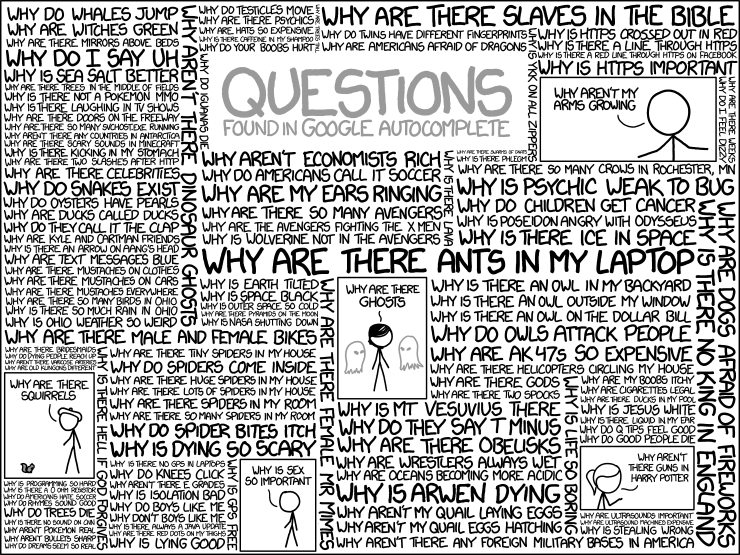I invite you to ask anything you’re wondering about that’s remotely related to effective altruism. There’s no such thing as a question too basic.
Try to ask your first batch of questions by Monday, October 17 (so that people who want to answer questions can know to make some time around then).
Everyone is encouraged to answer (see more on this below). There’s a small prize for questions and answers. [Edit: prize-winning questions and answers are announced here.]
This is a test thread — we might try variations on it later.[1]
How to ask questions
Ask anything you’re wondering about that has anything to do with effective altruism.
More guidelines:
- Try to post each question as a separate "Answer"-style comment on the post.
- There’s no such thing as a question too basic (or too niche!).
- Follow the Forum norms.[2]
I encourage everyone to view asking questions that you think might be “too basic” as a public service; if you’re wondering about something, others might, too.
Example questions
- I’m confused about Bayesianism; does anyone have a good explainer?
- Is everyone in EA a utilitarian?
- Why would we care about neglectedness?
- Why do people work on farmed animal welfare specifically vs just working on animal welfare?
- Is EA an organization?
- How do people justify working on things that will happen in the future when there’s suffering happening today?
- Why do people think that forecasting or prediction markets work? (Or, do they?)
How to answer questions
Anyone can answer questions, and there can (and should) be multiple answers to many of the questions. I encourage you to point people to relevant resources — you don’t have to write everything from scratch!
Norms and guides:
- Be generous and welcoming (no patronizing).
- Honestly share your uncertainty about your answer.
- Feel free to give partial answers or point people to relevant resources if you can’t or don’t have time to give a full answer.
- Don’t represent your answer as an official answer on behalf of effective altruism.
- Keep to the Forum norms.
You should feel free and welcome to vote on the answers (upvote the ones you like!). You can also give answers to questions that already have an answer, or reply to existing answers, especially if you disagree.
The (small) prize
This isn’t a competition, but just to help kick-start this thing (and to celebrate excellent discussion at the end), the Forum team will award $100 each to my 5 favorite questions, and $100 each to my 5 favorite answers (questions posted before Monday, October 17, answers posted before October 24).
I’ll post a comment on this post with the results, and edit the post itself to list the winners. [Edit: prize-winning questions and answers are announced here.]

- ^
Your feedback is very welcome! We’re considering trying out themed versions in the future; e.g. “Ask anything about cause prioritization” or “Ask anything about AI safety.”
We’re hoping this thread will help get clarity and good answers, counter some impostor syndrome that exists in the community (see 1 and 2), potentially rediscover some good resources, and generally make us collectively more willing to ask about things that confuse us.
- ^
If I think something is rude or otherwise norm-breaking, I’ll delete it.

Why there hasn't been a consensus/debate between people with contradicting views on the AGI timelines/safety topic?
I know almost nothing about ML/AI and I don't think I can form an opinion on my own so I try to base my opinion on the opinions of more knowledgeable people that I trust an respect. However what I find problematic is that those opinions vary dramatically, while it is not clear why those people hold their beliefs. I also don't think I have enough knowledge in the area to be able to extract that information from people myself eg. if I talk to a knowledgeable 'AGI soon and bad' person they would very likely convince me in their view and the same would happen if I talk to a knowledgeable 'AGI not soon and good' person. Wouldn't it be good idea to have debates between people with those contradicting views, figure out what the cruxes are and write them down? I understand that some people have vested interests in one side of the questions, for example a CEO of an AI company may not gain much from such debate and thus refuse to participate in it, but I think there are many reasonable people that would be willing to share their opinion and hear other people's arguments. Forgive me if this has already been done and I have missed it (but I would appreciate if you can point me to it).
This link could also be useful for learning how Yudkowsky & Hanson think about the issue: https://intelligence.org/ai-foom-debate
Essentially, Yudkowsky is very worried about AGI ('we're dead in 20-30 years' worried) because he thinks that progress on AI overall will rapidly accelerate as AI helps us make further progress. Hanson was (is?) less worried.